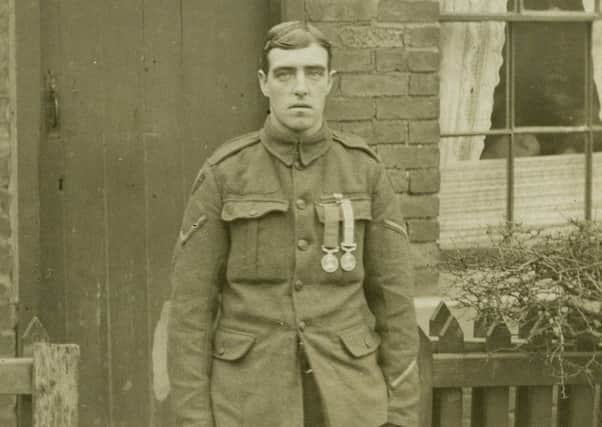Edwinstowe Somme hero's medals go under the hammer today


Lance-Corporal William R Peniston was a stretcher bearer at the Somme where more than a million soldiers died.
He was awarded the gallantry medals three times for his work in just three weeks which is an honour virtually unheard of.
Advertisement
Hide AdAdvertisement
Hide AdHis incredible story was highlighted this week as his medals went up for auction in London today, where they were expected to be sold for around £8,000.
They include the Distinguished Conduct Medal, Military Medal, G.V.R., with Second and Third Award Bars, The 1914-15 Star and British War and Victory Medals.
The former Thoresby colliery miner enlisted at the start of the Great War into the King’s Royal Rifle Corps, went as a stretcher bearer out to the Western Front.
During the battle of the Somme in 1916 during a three week period he was awarded no fewer than three medals for galantry, for his bravery going out into no-mans-land and bringing back wounded comrades.
Advertisement
Hide AdAdvertisement
Hide AdThe medals went under the hammer at London auctioneers Dix Noonan Webb on Wednesday.
Speaking on BBC Nottingham, Auctioneer Oliver Pepys said: ““To win one galantry medal would mark him out as a brave man, to win two would be extraordinary but to win three is virtually unheard of.”
“Primarily he would have been in a support role for those officers and men going over the top. First thing in the morning he would be there, helping to bring in the wounded and assisting in general administrative duties.
“The first of his bravery awards was awarded for the attack on Belville Delville ? Wood where his battalion suffered horrendous casualties.
Advertisement
Hide AdAdvertisement
Hide Ad“All the officers were either killed or wounded and the men rallied and were led by their NCOs and at the end of the day the batallion had suffered 289 casualties.
“He did not have a rifle and was unable to fire back or provide covering fire very much on his own.”
William Peniston was born on June 28 1889, at Oughtbridge, Sheffield, and educated at Wadsley Bridge Church School, Yorkshire.
He was a miner at Thoresby Colliery until his retirement and for 48 years he was a Corporal in the St John Ambulance Brigade.
Advertisement
Hide AdAdvertisement
Hide AdHe lived in Edwinstowe for the last 46 years of his life and died there at the age of 85 on October 10 1974.
Along with the medals is a letter from William to his girlfriend at the time.
It reads
‘Dear S,
Just a line telling you now I am a free man once more in France let my Sis know & all my friends. I cannot say when I shall land in England but you can rest at ease in knowing I am in the Pink I have been in France since last Sunday.
Yours Billy’
According to details extracted from the Regimental History, Peniston won his first M.M. on 26 August 1916, at Delville Wood; the D.C.M. on 11 September 1916, at Woodlane; and the first bar to the M.M. on 15 September 1916, at Flers-Courcelette. All four of his awards were won on the battlefields of the Somme. He appears to have been a prisoner of war at the end of the war.
Advertisement
Hide AdAdvertisement
Hide AdD.C.M. London Gazette 26 January 1918: ‘For conspicuous gallantry and devotion to duty during an action. His company came under enemy barrage fire which caused considerable casualties, and he remained behind under heavy shelling attending to the wounded, and helped to carry them to the aid post. He undoubtedly saved the lives of many seriously wounded cases by his prompt action, and set a fine example to the stretcher bearers under him.’